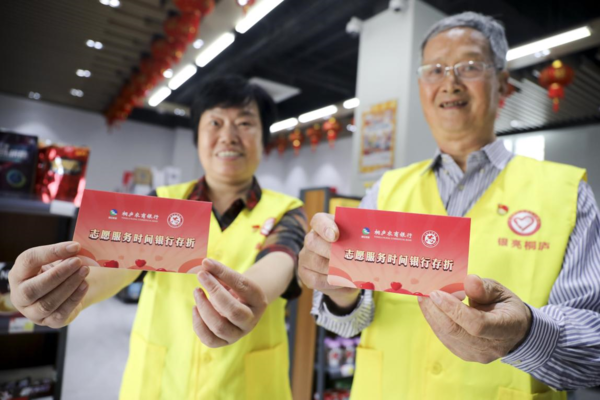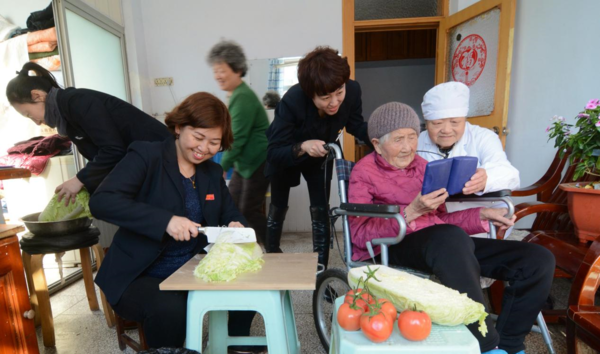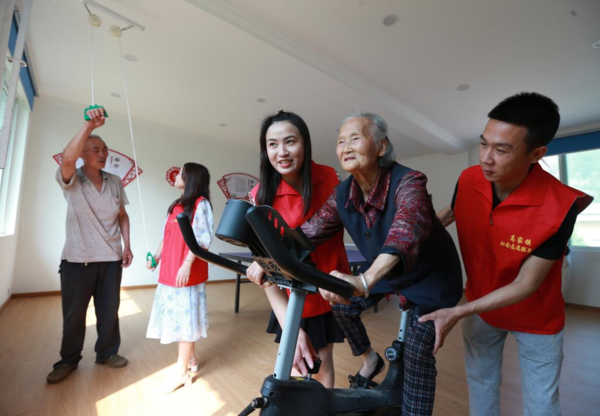By Wang Xinyue, Sun Chao, Yao Xueqing, People's Daily
Zhao Xiuying, a 61-year-old resident in Nanjing, east China's Jiangsu province, picked up the prescription medicine at a community health center early in the morning and bought some vegetables on her way back.
She did not take the medicines and vegetables home, but to the home of He, an 84-year-old woman who lives alone in the same neighborhood. Zhao runs errands for He twice a month.
After saying goodbye to He, Zhao opened a time bank mini program on her mobile phone and "saved" this volunteer service in her account.
"My balance stood at over 3,000 hours at most. I traded some of them for groceries and I'm planning to get some massage and health services with the rest," Zhao told People's Daily.

Zhao lives in the Yaohua neighborhood, Qixia district of Nanjing, where senior residents aged 60 years and above make up more than 20 percent of the local population. The neighborhood was the first to set up a time bank in Nanjing in 2014, to explore a new elderly care model - a reciprocity-based work trading system with which "the old serve the older."
The time bank encourages people to bank their service hours through voluntary works, in order to trade the hours for elderly care services or materials when they get older.
Wang Xiaohua is a lobby manager at the head office of Yaohua neighborhood's time bank. According to her, 7,666 volunteers have opened an account in the time bank. They have saved a total of around 420,000 service hours in the bank and traded for services more than 690,000 times, Wang said.
Wang introduced that the time bank was developed to a "3.0 version" in 2019 as its management platform was updated and a mini program launched.
Volunteers can open an account, apply for services and check their service hours on the mini program, and the program automatically matches their information to demanders according to time, locations, as well as the age and gender of the service providers.

The mini program has a simple user interface and adopts a big font size so that it's easy for seniors to use. Instruction activities were held in the neighborhood to help the seniors get familiar with the mini program, while the traditional manual bookkeeping method is also kept in the bank, said Wei Yingbao, head of Yaohua neighborhood's time bank.
In October, 2021, relevant departments of China jointly issued an action plan to further promote the development of the smart health and elderly care industry between 2021 and 2025. The plan aims to strengthen information technology support, upgrade relevant platforms, promote intelligent health services and carry out other elderly care measures.
According to the plan, new-generation information technology and smart devices will be applied in homes, communities, nursing homes and other elderly care scenarios. Innovation shall be made in "internet plus" elderly care, time bank and more smart elderly care services.
So far, the successful experience of the time bank model has been promoted to more areas in China, encouraging the society to participate in volunteer services for the elderly and community governance.

The Beijing municipal government issued a work report in January this year, which takes the development of the time bank model as a task. It said every service hour could be traded for a "time coin" in the account, which could be used to buy services or donated to immediate relatives. Volunteers with 10,000 time coins will be entitled to live in government-funded nursing facilities.
Apart from time bank, other new elderly care models are also being explored across China, such as a "caring map" that shows the locations of empty nesters and disabled seniors for better voluntary services, and a platform of home-visiting doctor service where the elderly can place orders online.
A smart elderly care service system is being improved with the assistance of technology, promoting high-quality development of the elderly care industry and enhancing the sense of happiness for the senior group.


